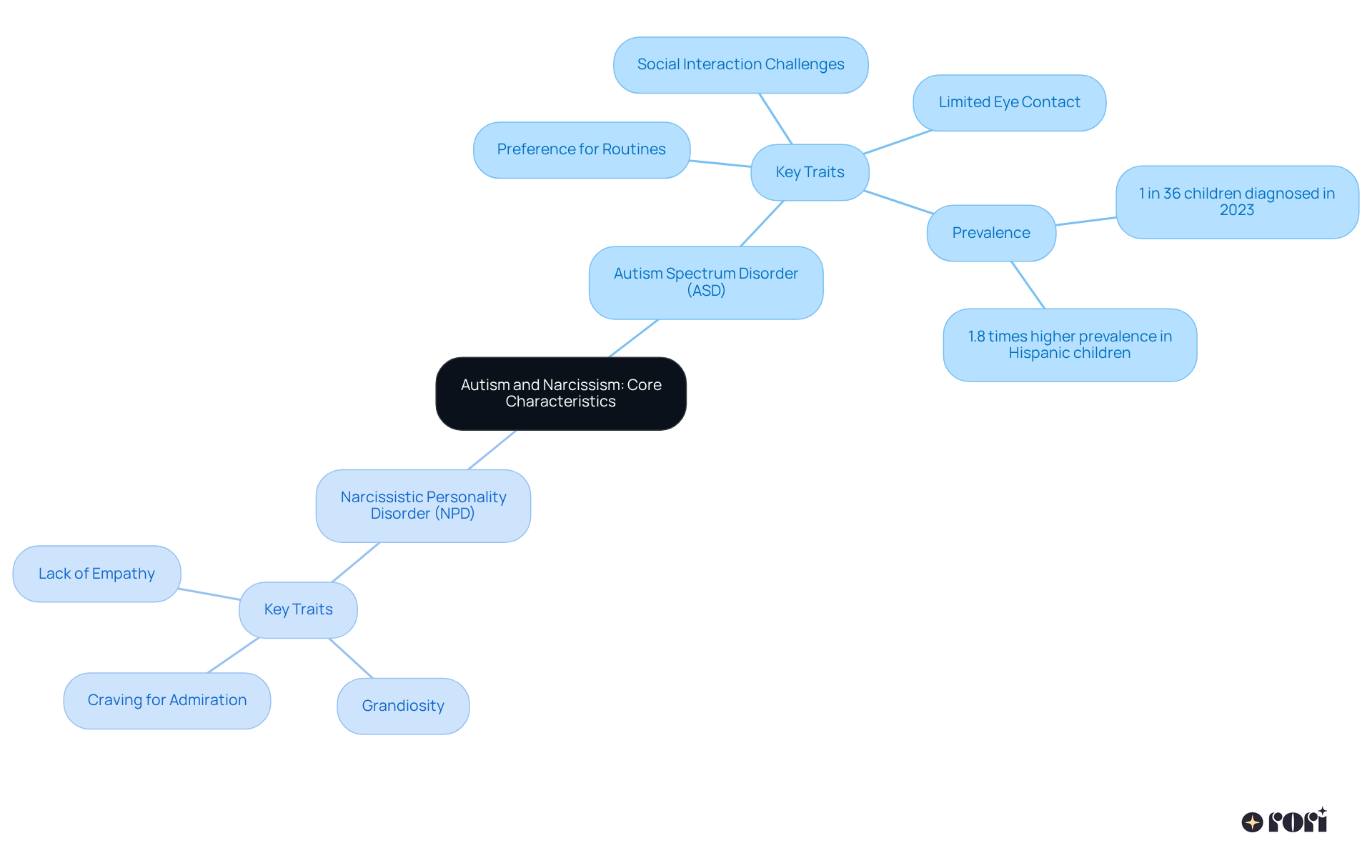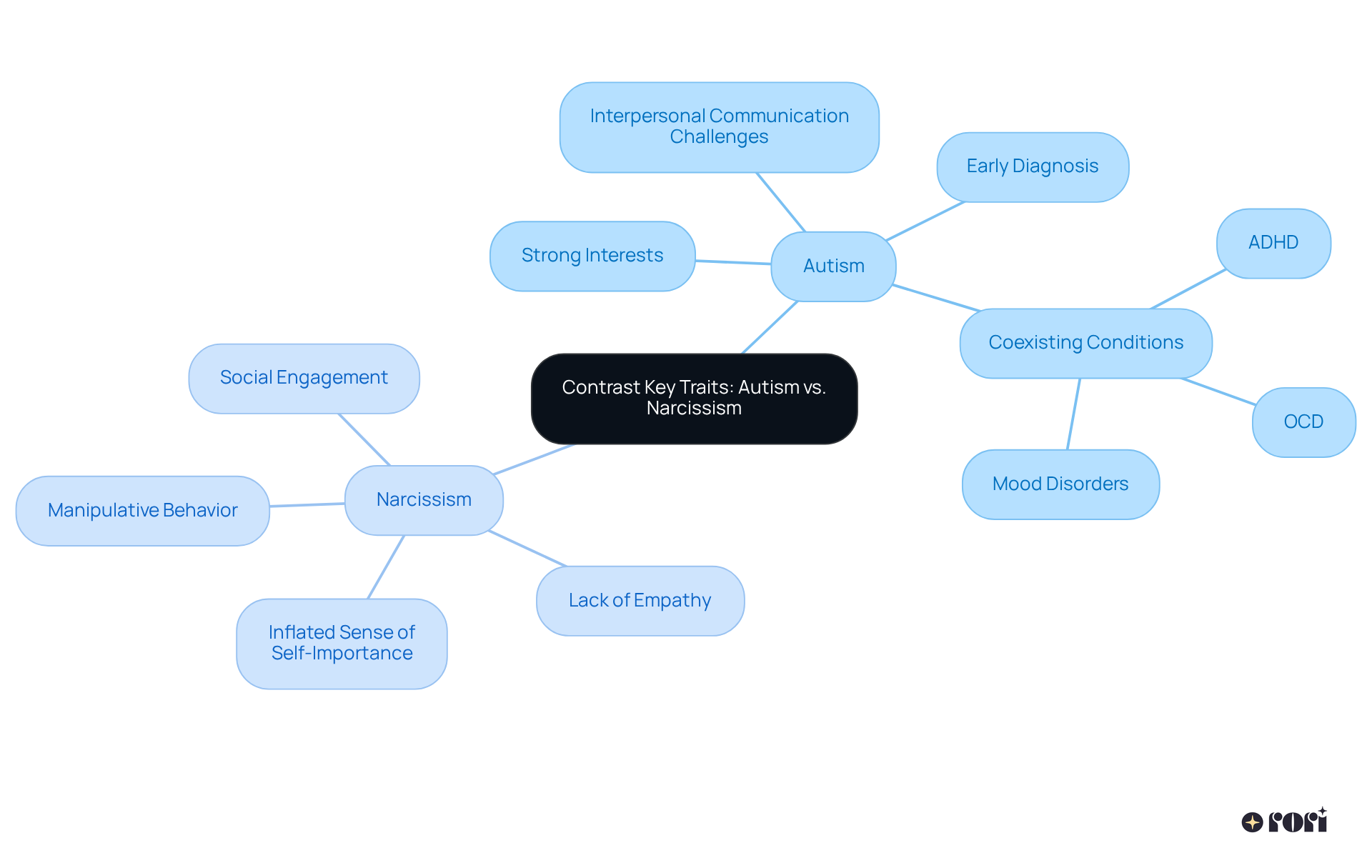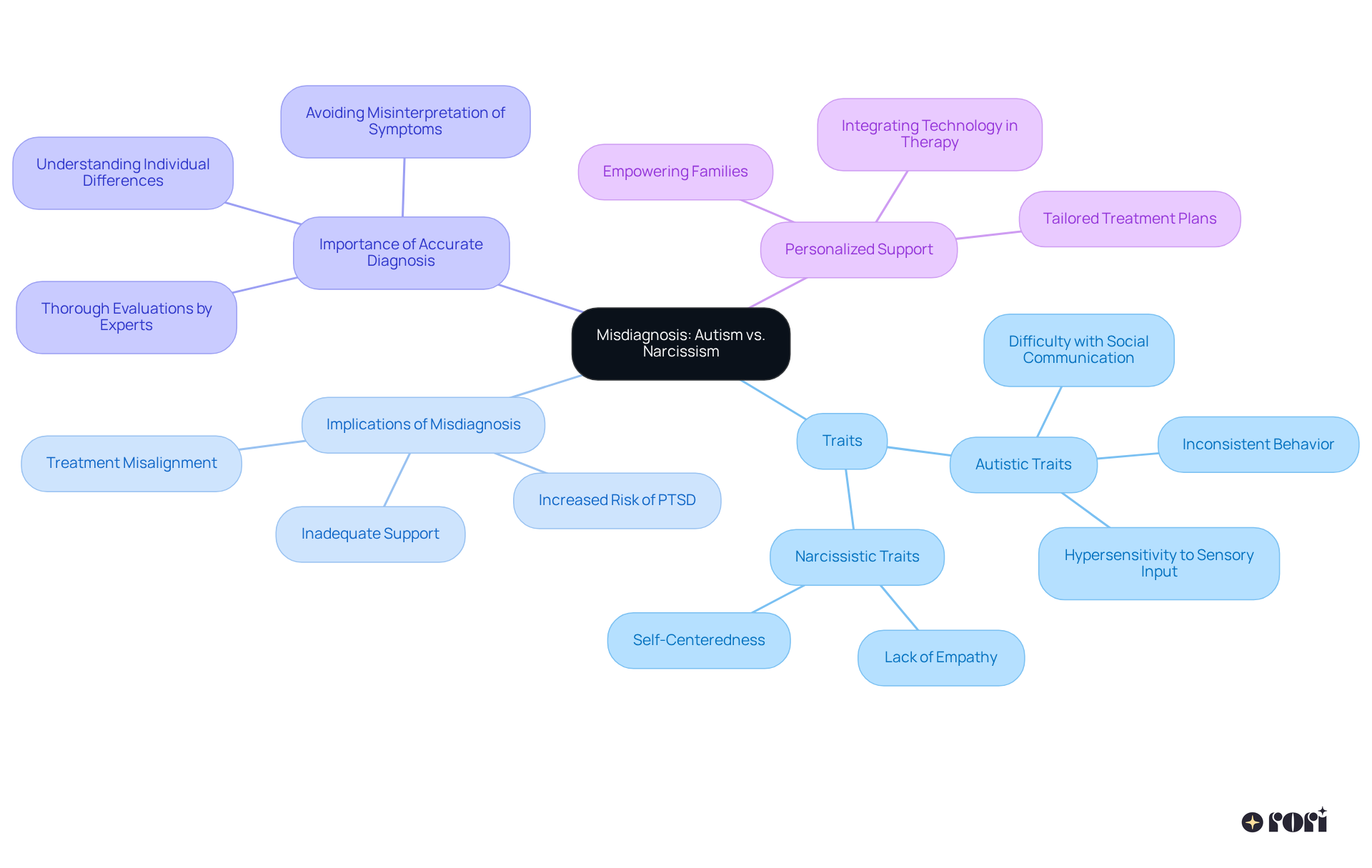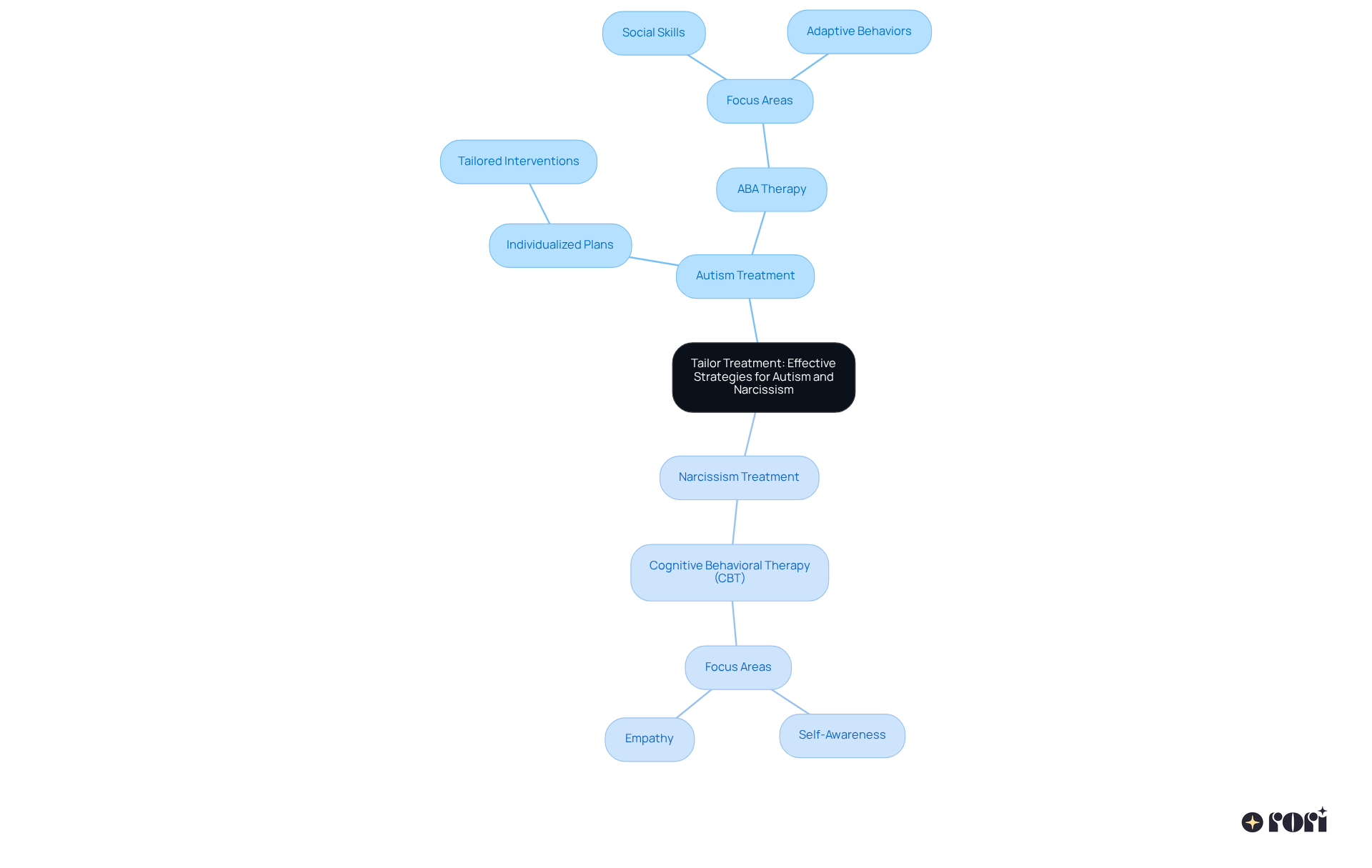You know, autism can sometimes be mistaken for narcissism, mainly because of some overlapping behaviors. For instance, social communication difficulties might lead others to misinterpret self-centeredness. It’s really important for clinicians to conduct thorough assessments to differentiate between these two conditions. Understanding their core differences is crucial for providing the right support and interventions. Let’s explore this together!
Understanding the complexities of human behavior is essential, especially when it comes to conditions like Autism Spectrum Disorder (ASD) and Narcissistic Personality Disorder (NPD). With so many children diagnosed with ASD, the nuances of these two conditions become increasingly relevant for families and clinicians alike.
This article dives into the critical differences between autism and narcissism, shedding light on how their overlapping traits can sometimes lead to misdiagnosis. Can the unique social challenges faced by autistic individuals be mistaken for the self-centeredness often associated with narcissism? Exploring this question reveals just how important it is to have accurate diagnoses and tailored interventions. This ensures that those affected receive the appropriate support. Let’s explore this together!
Autism Spectrum Disorder (ASD) is a developmental condition that can make social interactions and communication a bit challenging. You might notice some key traits, like difficulties in reading social cues, limited eye contact, and a strong preference for routines. Did you know that in 2023, about 1 in 36 children in the US were diagnosed with ASD? This statistic really highlights how common it is and why understanding it is so important for families.
On the flip side, we have Narcissistic Personality Disorder (NPD), which is a personality disorder characterized by grandiosity, a craving for admiration, and a noticeable lack of empathy. Individuals with NPD often come across as self-centered and entitled, sometimes even taking advantage of others for their own benefit. While both ASD and NPD can impact relationships, it's important to consider if autism can be mistaken for narcissism, as the reasons behind each condition and their manifestations in daily life are quite different. As Natalie Schad pointed out, '1 in 31 eight-year-olds in the US has been diagnosed with ASD,' which really emphasizes the need for us to understand its impact on interactions.
Let’s explore this together! Understanding these conditions can help us support our children better and foster healthier connections.

Understanding autism can feel overwhelming, especially when considering the unique challenges it presents. Many autistic individuals face significant hurdles in interpersonal communication. For instance, starting conversations or interpreting non-verbal cues can be particularly tricky. It’s not uncommon for them to have strong interests in specific topics, which can sometimes make social interactions a bit more complex. Early diagnosis, often as young as two or three years old, is crucial. It opens the door for timely interventions that can really enhance developmental outcomes.
On the flip side, narcissism comes with its own set of characteristics. Individuals with narcissistic traits often have an inflated sense of self-importance, coupled with a strong focus on fantasies of success. Unlike those on the autism spectrum, narcissists may lack genuine empathy for others. While developmental disorders can make social engagement challenging, narcissists often manipulate social situations to maintain their self-image and seek admiration.
Did you know that nearly 50% of people with Asperger's might also meet the criteria for ADHD? This overlap can complicate the diagnostic process. Moreover, research reveals that 28.7% of individuals on the autism spectrum scored above the 90th percentile on the Pathological Narcissism Inventory-52. This highlights the risk of vulnerable narcissism within this group. It’s essential to recognize this fundamental difference in motivation and behavior to accurately distinguish between autism and narcissism. Each condition has its unique social communication challenges.
Misdiagnosis can happen because of overlapping behaviors, which leads to the important question: can autism be mistaken for narcissism? Therefore, it’s vital for clinicians to conduct thorough assessments. Understanding these differences is key to creating tailored interventions that truly meet the needs of those affected. Let’s explore this together and ensure that we’re providing the best support possible for everyone involved!

A real challenge in misdiagnosis arises when we consider if autism can be mistaken for narcissism, particularly when individuals on the spectrum exhibit behaviors that resemble narcissistic traits. For example, an autistic child might seem self-centered because they struggle with social communication. This can lead to a mistaken diagnosis of narcissism, prompting the question of can autism be mistaken for narcissism, which is quite concerning! It's essential to recognize that not every autistic person shows the same signs or symptoms, making precise diagnosis a bit tricky.
Clinicians often emphasize that understanding the unique nature of autism is vital. Misreading symptoms can have significant implications for treatment and support. A thorough assessment by experts who understand both autism and narcissism is necessary to ensure that individuals receive the right support tailored to their needs.
Interestingly, while autistic individuals may find it challenging to empathize, they can still feel deeply—this is quite different from narcissism. By incorporating insights from clinicians about the complexities of diagnosing developmental disorders, we can explore how can autism be mistaken for narcissism, gaining valuable context. This highlights the importance of personalized support and interventions.
Let’s not forget that case studies illustrating how can autism be mistaken for narcissism really underline the need for accurate evaluations of developmental disorders. Together, we can explore this topic further and ensure that everyone gets the care they truly deserve!

When it comes to effective treatment for autism, many families find that Applied Behavior Analysis (ABA) therapy is a great option. This approach is all about enhancing social skills, communication, and adaptive behaviors. Individualized treatment plans are so important—they really cater to the unique strengths and challenges of each child, allowing for tailored interventions that help them thrive. Did you know that research shows about 68% of autistic individuals might meet the criteria for at least one personality disorder, raising the question of can autism be mistaken for narcissism? This includes traits related to narcissistic vulnerability, which raises the important question of whether autism can be mistaken for narcissism, emphasizing how essential it is to have nuanced approaches in treatment.
For those who show narcissistic traits, therapeutic methods like Cognitive Behavioral Therapy (CBT) can be quite helpful. CBT focuses on building greater self-awareness, empathy, and healthier relationships—key elements for personal growth. It’s crucial for therapists to recognize the distinct needs of developmental disorders and consider if can autism be mistaken for narcissism, using strategies that foster understanding and growth. By ensuring that both children with autism and those displaying narcissistic traits receive the right support, practitioners can help facilitate meaningful progress and enhance overall well-being. Let’s explore this together and see how we can support our loved ones on their journey!

Understanding the differences between Autism Spectrum Disorder (ASD) and Narcissistic Personality Disorder (NPD) is so important for getting the right diagnoses and support. While both can make social interactions tricky, they come from very different motivations and behaviors. Recognizing these differences helps clinicians, caregivers, and educators build better relationships and tailor interventions to meet each individual's needs.
In this article, we contrasted key characteristics of autism, like challenges in social communication and a love for routines, with traits of narcissism, such as grandiosity and a lack of empathy. We highlighted the risk of misdiagnosis between these two conditions, stressing the need for thorough assessments by qualified professionals. Plus, we discussed effective treatment strategies for both, showcasing how personalized approaches can really make a difference for those on the autism spectrum and individuals showing narcissistic traits.
Ultimately, understanding how autism can sometimes be mistaken for narcissism is vital for improving lives. By advocating for accurate diagnoses and tailored interventions, we can ensure individuals receive the support they truly need. This awareness not only helps those affected but also enriches the quality of relationships within families and communities. Let’s keep exploring these complexities together! Informed perspectives lead to better outcomes and greater empathy in our interactions with others. We're here to help you every step of the way!
What is Autism Spectrum Disorder (ASD)?
Autism Spectrum Disorder (ASD) is a developmental condition that can make social interactions and communication challenging. Key traits include difficulties in reading social cues, limited eye contact, and a strong preference for routines.
How common is Autism Spectrum Disorder in children?
In 2023, approximately 1 in 36 children in the US were diagnosed with ASD, highlighting its prevalence and the importance of understanding the condition.
What is Narcissistic Personality Disorder (NPD)?
Narcissistic Personality Disorder (NPD) is a personality disorder characterized by grandiosity, a craving for admiration, and a noticeable lack of empathy. Individuals with NPD often appear self-centered and entitled, sometimes exploiting others for personal gain.
How do ASD and NPD differ in their impact on relationships?
While both ASD and NPD can affect relationships, they have different underlying reasons and manifestations. It's important to consider these differences to avoid mistaking autism for narcissism.
Why is it important to understand ASD and NPD?
Understanding these conditions can help support children better and foster healthier connections, allowing families and individuals to navigate social interactions more effectively.